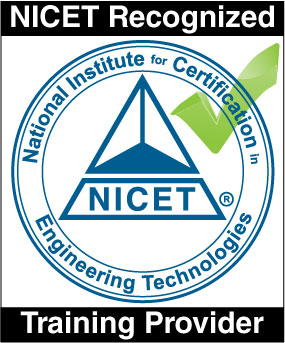
NICET Soil Testing Certificate Preparatory Course

HCCC is proud to announce the Construction Management program has received an Advanced Technology Education grant award of $300,000 from the National Science Foundation (NSF).

This course prepares students for the National Institute of Certified Engineers and Technicians (NICET) Level I & II Certifications, a nationally recognized and industry-wide accepted program in the field of Soil Testing. The NICET Certifications are most required by local and state jurisdictions, and by federal agencies. The National Institute of Certified Engineers and Technicians has recognized our institution as an official training provider for NICET Certifications.
The purpose of soil testing for construction is to determine the suitability of the soil for the type of construction to be done. NICET Certification levels outline a career path for advancement from entry to senior level. Level I is for technicians who perform routine inspection and testing tasks under general daily supervision. Level II is for technicians who need to work more independently. These certifications enable the technicians to determine sampling frequencies and procedures, collect samples, conduct a variety of soil tests, observe soil construction operations, follow safe work practices, apply job hazard analyses, perform equipment calibration, and report test results and observations to engineers.
NICET Certification Information
NICET Certification is one of the most prestigious and extensive vocational tests conducted across the United States of America for professionals in the Construction Industry. Certification often influences hiring, retention, promotion, and contracting decisions. It is equally beneficial for employers as it is for employees.
NICET-certified professionals undergo extensive training to identify and remedy deficiencies in the construction process quickly. NICET Level I & II certifications mean that any person certified in Construction Material Testing is guaranteed to have the qualifications necessary to fulfill industry needs. It means that the quality of work—and ultimately the quality of products and services—will be of the highest standards. The value of a NICET certification lies in what it says about the professionalism of the certification holder. The certifications also cover inspection, documentation, testing, work management, and safety.
Certification in Soil Testing helps students understand changing trends in the field of inspection, testing, safety, and environmental aspects of today's modern construction.
The National Institute of Certified Engineering Technicians (NICET) offers certifications in multiple areas at a different level of academic/experience levels related to a Civil Engineering Technology Program; The following are the major work areas where certification programs are offered:
Construction Materials Testing:
Asphalt, Concrete & Soils
Transportation Construction Inspection:
Highway Construction Inspection
NICET Certified Technicians are defined as “hands-on” members of the engineering team who work under the direction of Engineers, Scientists, and Technologists. They have knowledge of the components, operating characteristics, and limitations of engineering systems and processes particular to their area of specialization.
NICET Level I & II Soil Testing Certificate Preparatory Course
- Develop a broad knowledge and understanding of means and methods employed in construction and the significance of soil's role
- Identify issues and propose mitigation measures
- Inspect to ensure the suitability of the material
- Determine the quality of materials being used through testing
- Recognize an inspector's duties for providing quality and safe products
Personal and Worksite Safety:
- Determine and wear personal protective equipment (PPE)
- Inspect equipment
- Identify unsafe conditions
- Apply job safety analysis
Plans & Specifications:
- Relate plans to the field (e.g., find location on plan, establish relative elevation)
Sampling of Soil:
- Obtain samples
- Document sample locations
- Transport samples back to lab
- Identify type of materials of samples
- Log sample or I.D. the sample for lab testing (i.e., tracking)
Soil Sample Preparation:
- Reduce sample to test size
- Dry the sample
- Weigh the sample
- Process through sieve
- Moisture-condition the sample
Field Density Testing:
- Identify where to take the test
- Determine the number of tests
- Identify the type of material
- Document test location
- Document results
- Document limitations
- Perform assigned field density test
Lab Testing of Soil, Field Observation of Soils:
- Perform Atterberg limits
- Perform Proctor tests
- Perform sieve analysis
- Perform Washed -No. 200 sieves
- Perform moisture content test
Communication of Results:
- Inform client of presence.
- Give verbal report of observations to supervisor
- Complete test forms
Equipment Calibration and Maintenance:
- Verify equipment calibration
Personal and Worksite Safety:
- Determine and wear personal protective equipment (PPE)
- Inspect equipment
- Identify unsafe conditions
- Apply job safety analysis
Plans & Specifications:
- Relate plans to the field (e.g., find location on plan, establish relative elevation)
Sampling of Soil:
- Determine sampling locations
- Document sampling locations
- Obtain samples
Soil Sample Preparation:
- Reduce sample to test size
- Dry the sample
- Weigh the sample
- Process through sieve
- Moisture-condition the sample
Field Density Testing of Soils:
- Determine density test method
- Determine number of tests.
- Document test locations
- Document results
- Document limitations
- Perform assigned field density tests
- Perform dynamic cone penetration (DCP) tests
Lab Testing of Soil, Field Observation of Soils:
- Perform particle size analyses
- Perform specific gravity tests
- Perform unconfined compressions
- Perform organic content tests
- Perform laboratory California Bearing Ratio (CBR) tests
- Perform pH tests
- Perform testing for soil stabilization mix trials
- Perform shrinkage tests
- R - Value tests
Field Observation of Soils Construction Operation:
- Observe basic fill placement operations
- Observe basic shallow foundations installations
- Observe basic installation of deep foundation
- Observe soil stabilization
- Observe proof-rolling
Evaluation of Soils Test Results:
- Determine whether results meet specification
- Recognize suspect test results
Communication of Results:
- Prepare written reports for supervisors
- Give verbal reports to field representatives, consultants, and contractors
Equipment Calibration and Maintenance:
- Perform verification/calibration of test equipment
NICET Level 1 Certification (Preparatory Course)
June 1 - June 30, 2024
ONLINE COURSE
No Prerequisites Required
Total Hours: 32
8 Days, 4 hours a day
Saturdays and Sundays
9:00 am - 1:00 pm EDT
$350
NICET Level 2 Certification (Preparatory Course)
July 6 - August 4, 2024
ONLINE COURSE
No Prerequisites Required
Total Hours: 32
8 Days, 4 hours a day
Saturdays and Sundays
5:00 pm - 9:00 pm EDT
$350
For more information and registration, please email Chastity Farrell at cfarrellFREEHUDSONCOUNTYCOMMUNITYCOLLEGE.
Instructor Bio
Khursheed brings a wealth of experience to the classroom and the construction site. With 20 years of teaching experience, he has dedicated two decades to shaping young minds. His teaching philosophy revolves around practical application, ensuring that students grasp theoretical concepts and understand how they translate to real-world scenarios. Khursheed challenges students with authentic field problems through engaging class lectures and discussions. His commitment to fostering critical thinking skills has earned him the respect of colleagues and learners alike.
In the realm of construction project management, Khursheed's journey spans 25 years. Over this time, he has overseen various projects, from commercial buildings to infrastructure development. As a supervisor, Khursheed ensures that design projects adhere to permitting and regulatory requirements. His attention to detail and thorough understanding of construction conditions have contributed to successful project outcomes.
Khursheed believes in the power of demonstration. In the classroom or the boardroom, he leverages work samples and a comprehensive project portfolio to showcase his expertise. His ability to bridge theory and practice resonates with students and industry professionals.
The construction industry evolves rapidly, and Khursheed stays ahead of the curve. He regularly updates course materials to incorporate the latest trends, technologies, and best practices. By infusing fresh insights into his teaching, Khursheed prepares students for the ever-changing landscape of construction.
His class discussions delve into real-world projects he has successfully managed. Khursheed candidly shares the triumphs and hurdles faced during these endeavors. His transparency fosters a deeper understanding of the complexities inherent in construction management.
Khursheed's commitment to student success extends to well-prepared assessments. He has meticulously developed sample tests that challenge and equip learners for the road ahead.
Khursheed has taught NICET (National Institute for Certification in Engineering Technologies) courses at various levels for the past 15 years. His dedication to professional development ensures that future construction professionals are well-prepared for their careers.
Office of Continuing EducationContact Information
161 Newkirk Street, Room E504
Jersey City, NJ 07306
(201) 360-4224
CEFREEHUDSONCOUNTYCOMMUNITYCOLLEGE